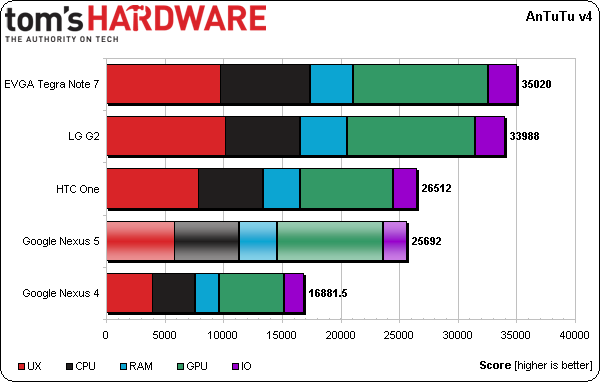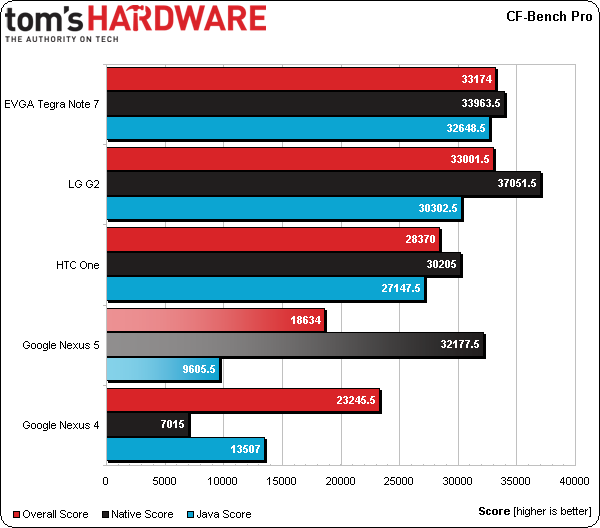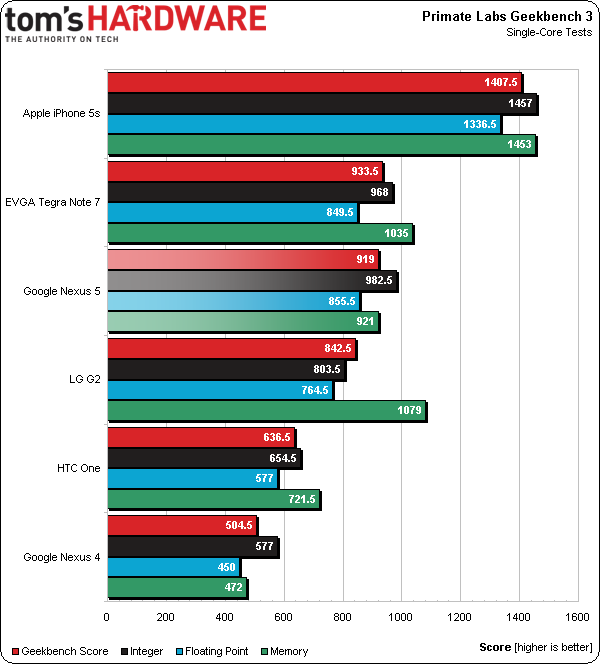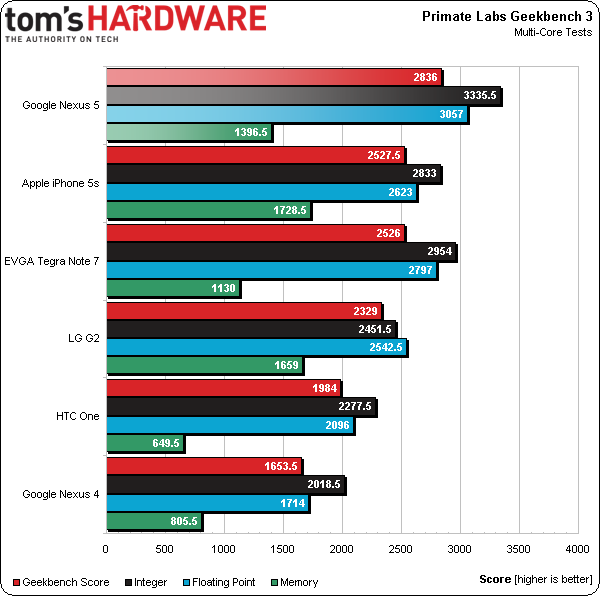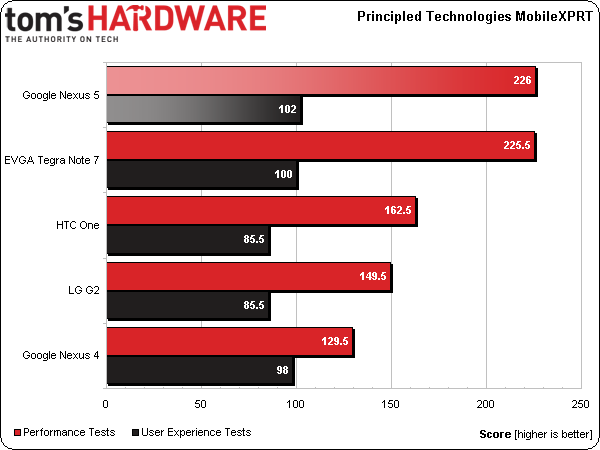Google Nexus 5 Review: A Fast, Affordable Phone With LTE For All
There's a new flagship smartphone in town. The LG-made Nexus 5 offers a fast Snapdragon platform, LTE for all markets, a 5” 1080p display, and Android 4.4 “KitKat”. Best of all, the 16 GB model sells for just $350 off-contract. Is it too good to be true?
Results: CPU Benchmarks
AnTuTu
AnTuTu is a benchmark designed to test the performance capabilities of four major aspects of mobile devices: Graphics (encompassing 2D, UI, and basic 3D), CPU (fixed, floating-point, and threaded), RAM (read and write), and I/O (read and write).
We can already see limits of this particular Nexus 5 in terms of CPU speed. It should be ahead of the HTC One, and at least somewhat level with its nearest equivalent, the LG G2 (another Snapdragon 800-equipped handset). However, it tests notably slower in pretty much every metric, and that's due to the nature of how AnTuTu's whole testing process is indelibly tied to the CPU core performance. Once that suffers, everything else does too. What's interesting is that this Nexus 5's Adreno 330 is measurably faster than the HTC One's, but not nearly as fast as it should be. Nvidia's previous-gen Tegra easily leads over the LG G2 and HTC One, but remember that it's also in a tablet form factor more forgiving of thermals.
CF-Bench Pro
Chainfire’s (developer of SuperSU, among other recognized Android tools) CF-Bench Pro is designed to characterize the performance of multi-core systems by simulating loads in Java, both in terms of natively-compiled and managed code. It tends to be a decent indicator of the tweaks vendors make to Android to try and eke out extra performance by optimizing for specific hardware features.
At first glance, this looks the same sort of result as the previous benchmark, with this Nexus 5 sitting below the HTC One, and it predominantly is, except that our Nexus 5 turns in an almost abysmal Java score that only marginally faster than the Nexus 4's. Yet, the this unit also manages to beat the HTC One in terms of Native code execution, and also comes within 20% of the LG G2.
Geekbench
Primate Labs’ Geekbench is somewhat of an industry standard due to its comprehensive database and wide cross-platform compatibility, supporting x86 Windows, PPC and x86 OS X, Linux, iOS, and Android. While Geekbench is more of CPU performance benchmark, it also covers some general memory performance. Geekbench’s approach is based on real-world applications and simulations of common tasks like file/data manipulation, compression, encryption, and image processing.
Seemingly out of nowhere, the Nexus 5 gives us its peak performance. We had to wonder if the phone was experiencing some sort of thermal issue in the previous benchmarks, so we tested with an IR thermometer and found nothing out of the ordinary; the Nexus 5 hit the same nominal temperature of 41-43 degrees Celsius observed in our other tests. The readings were taken across the back, where this unit consistently gets the hottest.
And here we go again. It's been proven elsewhere that Qualcomm's quad-core Snapdragon 800 beats Apple's dual-core A7 in threaded floating-point tests, and that outcome is reflected here. Except, what happened to LG's G2?
Get Tom's Hardware's best news and in-depth reviews, straight to your inbox.
Let's have a look at a similar test and see if we can't find a parallel.
MobileXPRT
Principled Technologies’ MobileXPRT is not dissimilar to certain aspects of Geekbench in that it simulates real world applications and use cases. Where it differs is twofold: first, it’s Android-only, and second, it simulates some more modern aspects that Geekbench doesn’t, namely Biometrics (Facial Recognition), UX (List Scroll, Grid Scroll, Gallery Scroll, Browser Scroll, Zoom, and Pinch to Zoom), and Photo Management (Apply Photo Effects, Create Photo Collages, Create Slideshow, and Organize Photos).
This turns out pretty similarly. Sure, some of the ordering changes slightly, and iPhone 5s isn't tested, but our supposedly-slower Nexus 5 takes the lead again. These tests were run sequentially right after the previous set, so whatever caused this Nexus to operate at full capacity was also in effect here.
Current page: Results: CPU Benchmarks
Prev Page Test Setup And Methodology Next Page Results: GPU Benchmarks-
guvnaguy Nice review. I think the whole $600-700 price for an off-contract phone is pretty much theft anyway, when the phones cost <$300 to make. Kudos, Google.Reply -
MoulaZX The Nexus 5 is extremely susceptible to thermal throttling which this article seems to gloss over or entirely miss.Reply
Yes PVS scores do indicate something. They indicate the efficiency of a chip at a given frequency. The lower PVS numbers will heat up faster, and thus be at the optimal 2.23Ghz frequency less often, thus giving the perceived impression of being significantly slower.
I have a Nexus 5 myself, same PVS scoring (1). Running Antutu in my hand, and I'll score 22,000 - 23,000. However, out of curiosity, I rest the phone on an AC vent for 15 minutes, started the Antutu benchmark while leaving it there, and managed to score 29,500. All results easily and consistently repeatable. And my phone has never been unlocked/flashed. 100% Factory ROM, 4.4.2.
The issue purely heavy thermal throttling under heavy sustained loads.
In day to day operations though, it is absolutely flawless, and felt ever so slightly snappier then my previous HTC One (M7). Still incredibly happy with this device, and the only one I have never felt the need to unlock and flash silly. My only gripe was Camera issues, but the 4.4.2 update resolved those problems. -
beetlejuicegr So a friend bought Nexus 5 and i bought his nexus 4 for me. Really happy with it even if its a last year's mobile. Economy crisis in Greece just won't give me space to buy Nexus 5 :P. Nexus phones are always on the the top list in quality and especially on price/quality mark. It is just that the way google sells them in Europe that is incompatible with the mentality of mobile buyers here. I bet my right thumb :P that if they had few actual shops inside shopping centers in Europe that they would sell like crazy. Now that i think about it, they know it, they just let other mobile companies for this, for android dominance perhaps? Just like what IBM did with PC and DoS? All were awed to see my Nexus One just when it was released few years ago, which i still have and still works fine, i doubt if an iphone or any 600+ $/euro mobile can survive that long right?Reply -
beetlejuicegr Oh and to add, this heating throttling might be annoying if it is used on a warm country like Greece i guess? Can the article elaborate on that? (room temperatures vs performance)Reply -
davidjan Great phone. N4 doesn't support OTG. But N5 supports. So can use Meenova MicroSD reader to add its storage: http://goo.gl/2iJ6gfReply -
clownbaby I finally pulled the trigger on a Nexus 5 and am upgrading my trusty old GNex. The unpolluted android system is by far the most underrated aspect of the Nexus devices. Paired with a crazy enthusiastic development community, Google offers a device experience that can't be had for any price by other manufacturers. To all of this, top end quick hardware is just icing on the cake. I would take a Nexus device with half the performance of an Iphone or Galaxy 4 just for the software environment.Reply -
yasamoka The LG G2 does not have a microSD slot. Only the Note 3 does out of the 3 handsets mentioned in the article.Reply
